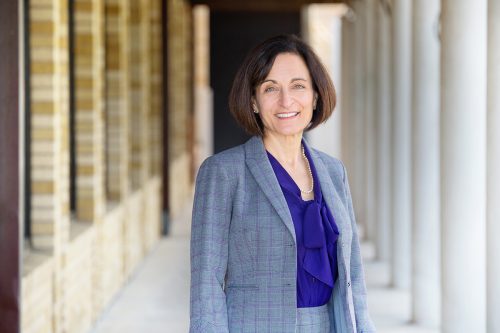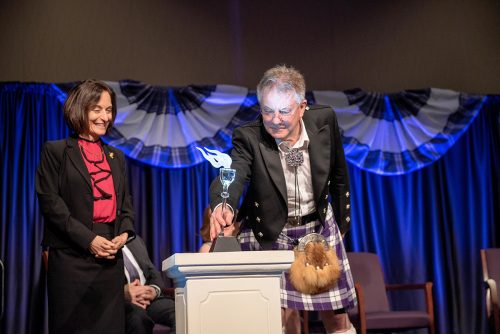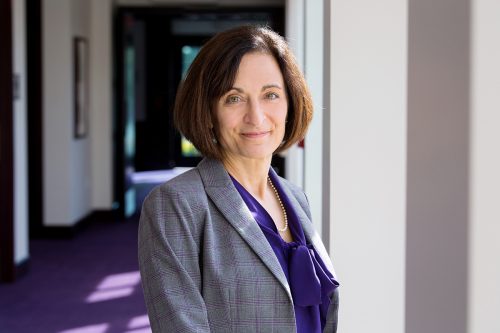Teresa Abi-Nader Dahlberg: The Torch Is In Her Hands
The new provost and vice chancellor for academic affairs is a first-generation college student and second-generation Lebanese American who recognized the value of ideas early in life.
Teresa Abi-Nader Dahlberg: The Torch Is In Her Hands
The new provost and vice chancellor for academic affairs is a first-generation college student and second-generation Lebanese American who recognized the value of ideas early in life.

Teresa Abi-Nader Dahlberg, provost and vice chancellor for academic affairs, said she sees an inclusive campus community as an educational imperative for graduating global citizens. Photo by Amy Peterson
What do you love about higher education?
Higher education is where people can transform their views and their lives. I vividly remember freshman English. My professor was totally immersed in discussing literature, bumping into desks as she moved about the room. She wore a skirt with crayon drawings and talked about her children. I had never met anyone as passionate. I decided then that somehow, someday, I wanted to be a professor.
You were a development engineer for IBM before joining academia — what skills or lessons from the corporate world have contributed to your academic success?
Successful companies create great products and spend the time needed to promote their products. This practice showed me that the communication of a great idea is as important as the idea itself. Throughout my career this has affected how I prepare lectures, write papers and grant proposals, and approach fundraising. I spend substantial time working on the communication of ideas with the intended audience in mind. How can I get an overloaded reviewer to understand the themes of my proposal? How can I get a first-year student to understand this concept? How can I mobilize others to reach common goals?
What drew you to TCU?
That answer is twofold. TCU’s mission resonates with my personal purpose. More than a decade ago I founded the STARS Computing Corps, a national consortium to advance service learning for STEM fields, where students use their disciplinary knowledge in service to communities that are often underserved. TCU’s focus on values, ethics, global citizens and community connections captured my attention. Also, TCU has the feel of a small, exclusive liberal arts college with the academic and social opportunities of a large, comprehensive university.
Discuss the importance of a liberal arts education in the 21st century.
The world is more connected now than ever, and a liberal arts foundation can develop one’s ability to acquire knowledge, think critically, communicate persuasively and be curious about difference. A liberal arts education prepares students, regardless of their major, to be continuous learners throughout their lives.
What is the biggest challenge facing higher education today and how can TCU prevail?
Diversity, equity and inclusion are essential for success in higher education. When I started working at IBM, I was the first female and youngest person in a large group, so I have experienced feelings of privilege and feelings of “other” at different times in my life.

Provost emeritus R. Nowell Donovan symbolically passed the “torch of knowledge” to Teresa Abi-Nader Dahlberg at his retirement ceremony. Photo by Glen E. Ellman
As the values and identity of the younger generations continue to change, and the world becomes more global, multicultural and influenced by technology, higher education must adapt. I am pleased that TCU is committed to creating and fostering an environment in which our faculty, staff and students can thrive, and I am in a position to help set a strategy to move the university’s DEI efforts forward.
I see an inclusive campus community as an educational imperative for graduating global citizens.
One of TCU’s strategic imperatives is to raise the university’s academic profile/reputation. Are there any guidelines that you, as provost, have in mind (or from prior experience) to help shape this process?
I’ve experienced various practices at different universities and realize that a best practice is not necessarily best for all institutions. Getting to know the TCU culture will enable me to draw from prior experiences to complement that culture.
We must offer a visibly distinctive student experience that adds value to TCU graduates throughout their lives. Visibly distinctive means that we need to be excellent and we need to be perceived, nationally, as being excellent.
My prior experience with faculty research, strategic planning and fiscal health, advancement initiatives and DEI efforts gives me some level of credibility, and my position as provost provides me visibility. Together, these will enable me to advocate for existing and new initiatives to lead our collective realization of the aspirational goals set forth in TCU’s strategic plan, Vision in Action: Lead On.
Do you have a mentor? If so, how has this individual shaped your leadership style or professional success?
I am fortunate to have several people who support me as a mentor, but most memorable is someone to whom I reported several years ago. He had a way of empowering those who reported to him — making each person feel competent and unafraid to take risks. I aspire to this aspect of his leadership style.

Teresa Abi-Nader Dahlberg, provost and vice chancellor for academic affairs, has a passion for communication. Photo by Amy Peterson
How will you approach your new role as chief academic officer?
The chief academic officer has oversight for the academic mission of the university, and faculty are the keepers of the curricula. I see my role as collaborating with deans, chairs and faculty to continuously review and refresh our programs. A goal is to empower leaders who are able to listen, collaborate, synthesize and inspire — so that as we continue to excel, we maintain our distinctive culture.
As we welcome new deans to a handful of schools and colleges in the coming months, I must articulate a clear and compelling vision for how we will advance our academic mission in a continuously changing world. It’s an exciting time for all of us at TCU.
What is the best piece of advice you ever received?
Be yourself.
Editor’s Note: The questions and answers have been edited for length and clarity.

Your comments are welcome
1 Comment
One area at TCU seems to fall short: Discussing how the modern natural sciences might harmonize with Christianity.
Why not start the discussion in a group of faculty interested and dedicated to this topic?
LEAD TCU< GO FROGS!
Rudy
Related reading:
Mem’ries Sweet
History of the Provost
What’s in a title?
Letters
Provost Donovan Passing the Torch
Last year Provost Nowell Donovan made the bittersweet announcement of his retirement this May. As provost and vice chancellor for academic affairs since 2004, Donovan is the senior member of the Chancellor’s Cabinet, responsible for academic leadership and policy.
Features
Community Scholars Bring New Perspectives
Scholarship program opens up a world of possibilities to North Texas’s underserved elite students.